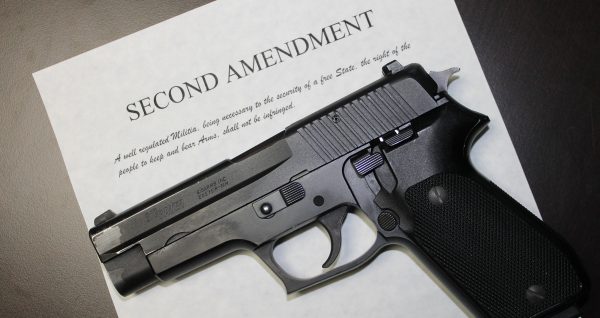
By Dave Workman
Editor-in-Chief
Something remarkable happened this week. The Second Amendment Foundation applauded the American Civil Liberties Union for submitting an amicus brief Ninth U.S. Circuit Court of Appeals in support of Second Amendment rights.
In a prepared statement to the media, SAF founder and Executive Vice President Alan Gottlieb declared the ACLU had taken a “remarkable and refreshing approach” on gun rights in a case known as U.S. v. Duarte. The case involves a man named Steven Duarte who was convicted of being a felon in possession of a firearm due to a prior conviction of a non-violent felony.
Duarte had previously been convicted of nonviolent offenses such as vandalism and drug possession.
In its 40-page amicus brief, the ACLU contends Duarte “did not forfeit his Second Amendment rights because of a past, nonviolent felony conviction.”
“The ACLU has produced a stunningly detailed amicus brief supporting the Second Amendment,” said Gottlieb. “While acknowledging its history of concerns regarding gun-related violent crime, in this case the ACLU properly criticizes federal law for permanently disarming people previously convicted of nonviolent offenses, including misdemeanors where a state legislature has imposed a sufficiently long possible prison sentence to result in a lifetime loss of Second Amendment rights. Thus, as the ACLU sagely observes, someone could be put in prison for ‘the most fleeting, innocuous, or merely constructive ‘possession’ of a firearm’.”
The ACLUs brief has some fascinating passages, including noting, “while the government has arguably shown a tradition of temporarily restricting possession by people who are found to pose a risk of violence or danger, it fails to show how that tradition can justify permanently disarming people who have not been found to pose such a risk—solely because they were convicted at any point in the past of an offense punishable by more than one year in prison.”
Elsewhere, the brief argues, “Steven Duarte’s case exemplifies section 922(g)(1)’s far-reaching breadth. The government does not dispute that Mr. Duarte has been convicted only of nonviolent offenses, such as vandalism and drug possession. And it has never contended that he poses a danger or threat of violence to others. Nevertheless, the government prosecuted and convicted Mr. Duarte solely under section 922(g)(1), for which he is now serving more than four years in federal prison.”
The strength ACLU’s arguments compelled Gottlieb to observe, “We are delighted the ACLU recognizes the government has wielded a very heavy hand in its enforcement of federal statute 922(g)(1), not only against Mr. Duarte, but also against other people. The ACLU makes a compelling argument that the government has failed to justify permanently stripping people of their Second Amendment rights, when they do not pose a risk to society, simply because of a previous conviction that might be punishable by more than a year in prison.”
Joining in the amicus brief are ACLU chapters in Northern and Southern California, Arizona, Nevada and Alaska.
In a release to the media, Ceclia Wang, ACLU deputy legal director explained, “As a matter of law, Mr. Duarte’s conviction fails the Supreme Court’s constitutional test because there is no history or tradition to support the permanent stripping of Second Amendment rights based solely on a past criminal conviction. The government’s extreme argument – that only ‘responsible, law-abiding citizens,’ as defined by a federal prosecutor, enjoy the rights of ‘the people’ under the Second Amendment — is contrary to the constitutional text and was firmly rejected by the Supreme Court just last term.”
“Bravo to the ACLU for submitting this brief in Mr. Duarte’s case,” Gottlieb said.



